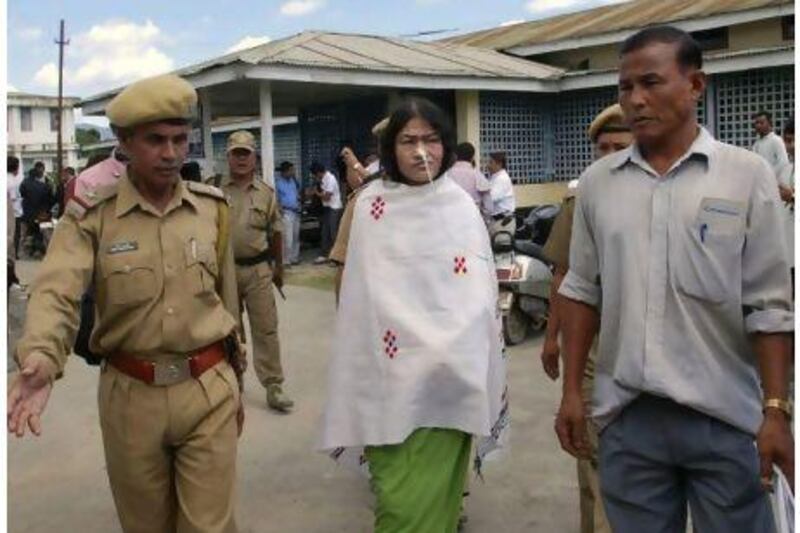NEW DELHI // Two Indian hunger strikers, Anna Hazare and Irom Sharmila, both used the same non-violent weapon - but one amassed nationwide support in days, the other lies on a hospital bed in obscurity.
Ms Irom, arrested and confined to a medical college ward in the remote, revolt-hit northeastern state of Manipur, has been on hunger strike for more than 10 years to protest against a controversial anti-insurgency law.
Indian authorities force-feed the "Iron Lady of Manipur", as she has been dubbed, through a plastic drip in her nose to prevent her death.
While nearly a million people thronged the New Delhi venue where the social activist Mr Hazare, 74, staged a 12-day anti-corruption fast this month, Ms Irom has never experienced such a massive groundswell of support.
Mr Irom's brother, Irom Singhajit, said from Manipur's capital, Imphal: "My sister is the world's longest hunger striker but who cares about her and her cause? Who cares about a faraway state?"
Ms Irom, now 39, a poet, launched her fast in November 2000, demanding repeal of the draconian Armed Forces Special Powers Act following the killing of 10 people by troops in retaliation for a militant attack.
"My sister was not fortunate enough to be able to turn her protest into a popular movement as she was arrested immediately on charges of attempted suicide," said Mr Irom.
Manipur is home to 2.5 million people and around 30 ethnic insurgent groups.
The government has dismissed appeals from Ms Irom and others to end the sweeping emergency powers that human rights groups say give security forces a licence to shoot and arrest with impunity in both the north-east and in Indian Kashmir, which has been racked by revolts.
Every two weeks jail officials produce Ms Irom in court to renew her judicial custody on charges of trying to kill herself. Her family members must seek court permission to visit her.
In contrast Mr Hazare's fast ended last weekend when the national government conceded in principle to the former army lorry driver's demands for tougher anti-corruption legislation.
Mr Hazare wrote to Ms Irom while he was staging his hunger strike, urging her to join the New Delhi protest.
But Ms Irom wrote from her hospital bed: "I am unlucky because I cannot come to New Delhi. I am not a free Indian."
She backed Mr Hazare's movement against corruption, but also said she wished people across India would support the fight for repeal of the emergency law.
It is a forlorn hope, according to political analysts.
Ravi Bahl, a sociology professor at Delhi University, said: "Anna's movement targets corruption, an issue spread throughout the Indian system, which bothers every Indian."
He said Ms Irom would have generated much more support if she and her cause had been based in a major city such as New Delhi. "He had the location advantage," he said of Mr Hazare.
Ms Irom's fast has never generated much debate in India's national parliament because of New Delhi's indifference towards distant Manipur, which shares a border with Myanmar, other analysts said.
Ranjan Thapa, a political analyst at the Centre for Eastern Political Research in Kolkata, said: "The Indian government made Anna Hazare a hero but they treat Irom Sharmila like a criminal,.
"This reflects the discrimination against north-eastern states," he said. "Irom Sharmila lives in a fringe state and will never get to centre-stage."





